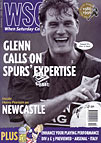 Boyd Hilton explains why the manner in which Bruce Rioch was removed from his job came as no surprise to Arsenal supporters
Boyd Hilton explains why the manner in which Bruce Rioch was removed from his job came as no surprise to Arsenal supporters
I’m almost starting to enjoy the daily stream of conjecture and rumour surrounding Arsenal. Only a few years ago life was this exciting for fans of Tottenham, these days a model of stability on and off the pitch. My guess is that all this talk of an ‘Arsenal crisis’ will soon be forgotten, though that doesn’t excuse the bizarre behaviour of the Arsenal board.
For all the clichés about Old Etonians, Marble Halls and ‘doing things the Arsenal way’, it has been clear to supporters for years that our club is no different to any other: the board are just as ruthless (if not more so) and determined to safeguard their own power.
Ten years ago, Arsenal directors, tiring of Don Howe’s negative tactics, went behind his back to try to persuade Terry Venables to be their new manager. The deal fell through. This time round, Peter Hill-Wood and co seem to have been wheeling and dealing to secure A Certain Frenchman while Bruce Rioch was still studying the small print in his contract (granted, he’d been studying it for over twelve months).
Hill-Wood admitted this at the recent, farcical Annual General Meeting, but then he held his hands up and exclaimed that this is the way things have to be done these days. Which makes Tony Adams’ recent post-Rioch comments about Arsenal always going about matters with a sense of propriety and morality (I’m paraphrasing here) all the more preposterous.
Whatever brave face is being put on the current Highbury ‘crisis’, there is more than a whiff of mystery surrounding the real reason why Arsenal sacked Bruce Rioch. It seems suspicious to me, for example, that just prior to the ousting of Rioch, vice chairman David Dein sold a large number of his shares to majority shareholder Danny Fiszman (routinely referred to in the media as a ‘wealthy diamond merchant’), meaning effectively that Fiszman is now the most powerful board member. Hill-Wood has to carry the can at public meetings, but Dein and Fiszman are pulling the strings.
David Dein has a cocksure swagger about him, and clearly wants to build a club in his own image. Apparently, he has been a close friend of un certain Arsène Wenger for a while. Before Rioch got the job, Wenger was mentioned, along with Bobby Robson, as a possible successor to George Graham. But neither Wenger nor Robson would drop their long-term contractual obligations (did these guys have morals?), so Arsenal ended up with Bruce Rioch.
Sure, Rioch signed Bergkamp and Platt, and tried to introduce the team to the curious concept of passing, but he was hardly the charismatic 1990s Euro-coach of David Dein’s dreams. Maybe they should have just called him a caretaker manager and let him, and us, know that as soon as one of these continental types became available (or nearly available), he would be dumped.
Rioch’s famous list of 29,000 transfer targets (mostly left-backs) may have included some very big names, but the board’s lack of enthusiasm for signing any of Rioch’s suggestions must have reflected their general lack of enthusiasm for him. Why else did they even fail to sign an ex-Bolton player whose agent was Rioch’s own brother?
In deeply ironic contrast, the board has managed to sign two of Wenger’s targeted players before he’s even joined the club himself! If Wenger can get the team playing great football, we’ll all hail the great coup which toppled poor Rioch and the nature of his dismissal will fade in the memory, just like the shoddy dumping of Don Howe a decade ago.
Those Arsenal fans (and I don’t think there are many) who are working themselves into a moral lather about the current situation would be better advised to sit back and enjoy the excitement. Integrity, morality and ethics clearly have no relevance to The Arsenal, and I wonder if they ever did.
From WSC 116 October 1996. What was happening this month